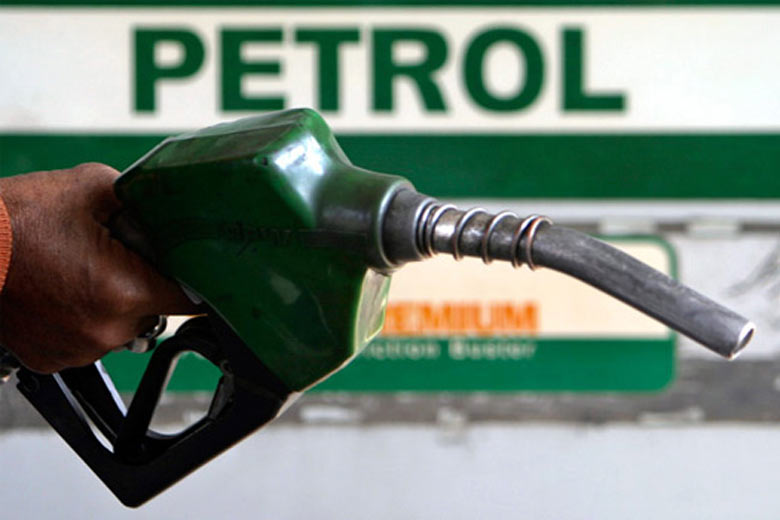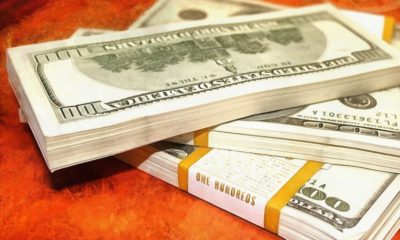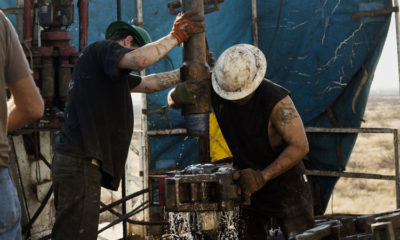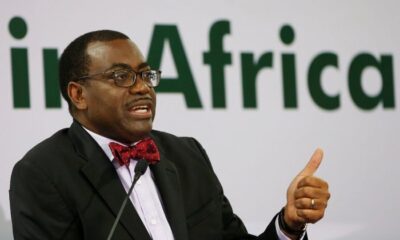Markets
Marketers Justify Selling Petrol Above N86.50 – Punch
Published
9 years agoon

The reason why many filling stations across the country have refused to comply with the Federal Government’s directive to sell a litre of petrol for N86.50 as against the old pump price of N87 is because most of them had stockpiled the product in anticipation of a likely price increase by the government.
Compliance by filling station owners with the new pump price of N86.50 for a litre of petrol has not been great across the country even though the Department of Petroleum Resources, the regulator of the downstream petroleum sector, has vowed to punish defaulters.
In some instances, the filling station owners and managers have become more daring, displaying new prices above the stipulated maximum on their petrol dispensing pumps.
One of our correspondent actually bought petrol at a filling station along Gbongan Road, Osogbo, the Osun State capital for N110 per litre on Monday. The price was proudly displayed on the digital dispensing machine instead of the practice before of displaying the regulated price of N87 per litre, but the attendants would inform the buyer of a higher price and the difference would be calculated based on the volume bought.
When asked why the station’s management was bold to display N110 as the pump price, a female attendant simply said that was the instruction given by the owners.
The PPPRA had on Tuesday, December 29, 2015, announced that retail filling stations belonging to the Nigerian National Petroleum Corporation would from Friday, January 1, 2016, sell petrol at N86 per litre, while other marketers would sell the product for N86.5 per litre.
In Jos, the Plateau State capital, most major marketers are still selling at N87 per litre despite the N0.50 reduction in the fuel price. Only the NNPC mega stations have adjusted their pump price to the N86 stipulated by the PPPRA.
Some of the marketers told one of our correspondents that they could not afford to sell below that as they still had old stock.
One of the attendants, who simply identified himself as Ahmed, said the inconsistency in the Federal Government’s pronouncement prompted some marketers to hoard the product in anticipation of a price increase later.
“Our station discharged a full tanker before the New Year, but we were afraid of what the new price will be. However, we are for now sticking to the old price because we are still having our old stock,” he explained.
In Anambra State, a litre of petrol sold for N140 on the average on Monday as many filling station owners pretended not to have heard about the new price regime.
An attendant at a filling station in Awka said, “I don’t know about any new price for petrol. We sell a litre here for N140.”
A manager at a filling station, who pleaded anonymity said, “The new price you are talking about may be for government filling stations like those belonging to the NNPC and not for private filling stations.
“Besides, what we have here is old stock. We didn’t even buy at that price you are talking about.”
Filling stations in Enugu State have yet to comply with the Federal Government’s directive on the new pump price of petrol.
One of our correspondents, who monitored the situation on Sunday and Monday, observed that the product was being sold for between N120 and N150 per litre in different parts of the state.
In Oyo State, one of our correspondents found out that only a few independent marketers had the product and they sold a litre at prices ranging between N100 and N130.
Some of the independent marketers, who spoke on the development, said that they purchased the product at an inflated amount in Lagos.
“We are aware of the government’s directive but the truth is that we cannot sell at the government price when we purchased the product above N100 per litre in Lagos. Look around Ibadan and you will see that only independent marketers are selling the product. The major marketers cannot because they cannot buy at a high cost and sell at a loss,” he station manager of an independent filling station in Mokola area of Ibadan said.
In Niger State, independent marketers have not complied with the N86.50 per litre price regime as one of our correspondents who went round Minna, the state capital, on Monday observed that filling stations were selling the product at the old rate of N87 per litre.
The state Controller, DPR, Mr. Abdullahi Jankara, however, said he had not received any directive from the Federal Government on the new fuel price.
Filling stations in Uyo metropolis sold the product for N130 per litre on Sunday and Monday even as many of them did not open for business.
The only filling station seen selling petrol at N86 per litre was the NNPC mega station on Ikot Ekpene Road, Uyo.
A former Chairman of the Independent Petroleum Marketers Association of Nigeria, Mr. Victor Eteafia, said the downstream sector of the economy was facing a crisis.
In major cities in Ogun State, a litre of petrol was still sold for between N100 and N130 on Sunday and Monday.
In Rivers State, the product is selling for between N130 and N140 per litre as against the Federal Government’s new price regime of N86.5.
At Romans Filling Station located on Ada George Road, petrol has been selling for N130 per litre in the past one week. The filling station had been dispensing the product for N140 per litre before Christmas.
Also in Kogi State, it was gathered that the major marketers were selling the product at N87 per litre while other marketers still sell as high as N120 per litre.
The Kwara State Chairman, Independent Petroleum Marketers Association, Mr. Olanrewaju Okanlawon, said members of the body bought their current petrol stock at the old price and would comply as soon as they start buying it at the new ex-depot price.
A former Treasurer of the Independent Petroleum Marketers Association of Nigeria, Western Zone, Mr. Shina Amoo, told one of our correspondents in Osogbo that independent marketers could not comply with the directive on the new petrol price because they bought the product higher than the approved price.
He said, “I bought the product for N102 per litre on Thursday and later I bought it at N94.5 per litre. So, you don’t expect anybody who bought at those prices to sell a litre for N86; it is not possible.
“The price will continue to come down as supply increases. Government will not need to force anybody to reduce the price; the forces of demand and supply will determine the price.”
When contacted for comment on why some filling stations were not complying with the new pump price regime, the National President, Independent Petroleum Marketers Association of Nigeria, Mr. Chinedu Okoronkwo, said he expected all outlets to comply before the end of this week.
He stated that some of the filling stations still had old stocks, adding that they would have to adjust to the new price when they finish selling those stocks.
When asked if the government was still paying the marketers the bridging claims, Okoronkwo said, “There is still bridging fund. We have not been informed of any change.”
The Federal Government, through the Petroleum Equalisation Fund, pays bridging claims to the marketers to ensure that there is uniform pricing system across the country and ensure that each marketing company complies with the laws regarding the management of the transportation equalisation process.
The Deputy Manager, Communications, DPR, Mr. George Ene-Ita, said, “If they (filling station owners) don’t comply, we will sanction them; either we shut down the stations or fine them. Monitoring is a routine thing. We have a standing monitoring and compliance unit in the DPR. It is a routine procedure; it never stops.
“It is not just to monitor and enforce the government-regulated prices, but also to monitor and enforce compliance with all regulatory issues concerning the downstream. And that is going on; we are ensuring that every marketer and every facility owner complies with the new official pump price.
Informed that some marketers were selling at higher prices because they still had old stock, Ene-Ita said, “That does not concern us. Government did not stipulate two pump prices, one for old stock and one for new stock.”
Is the CEO and Founder of Investors King Limited. He is a seasoned foreign exchange research analyst and a published author on Yahoo Finance, Business Insider, Nasdaq, Entrepreneur.com, Investorplace, and other prominent platforms. With over two decades of experience in global financial markets, Olukoya is well-recognized in the industry.

You may like
-
Nigeria Seeks $15bn Investment to Revamp Power Sector, Offers Higher Tariffs
-
Nigeria’s Economy Shows Signs of Recovery with December PMI at 51.0
-
Nigeria Joins BRICS as Partner Country, Strengthening Global South Cooperation
-
70 Million Poorest of The Poor Nigerians To Get N75,000 From FG
-
Nigeria Surpasses OPEC Quota with 1.51 Million bpd, Targets 2.06 Million in 2025
-
Global Investors Commit $7.6 Billion to Nigeria’s Development at AIF 2024















